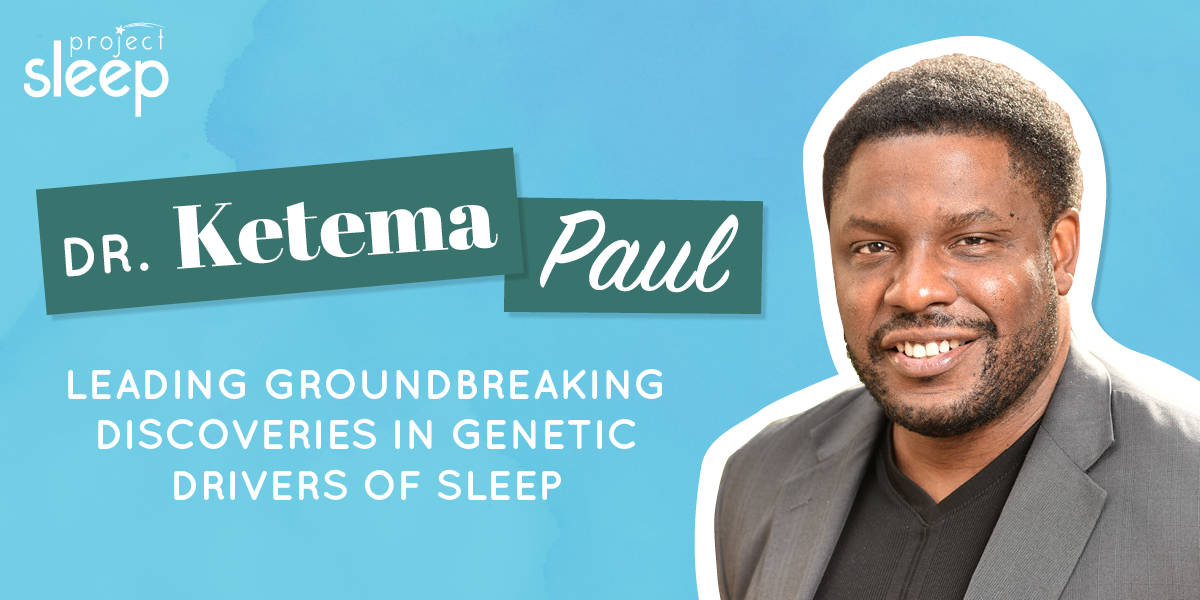Written by Anna Marr. Graphics by Eleanor Wales.
Dr. Ketema Paul: Black History Month Sleep Leaders Part 7
To celebrate Black History Month, Project Sleep is honored to highlight incredible accomplishments and contributions of Black Americans from across the sleep field—from scientists to advocates. Please join us in celebrating Black excellence by spreading the word about these sleep community leaders!

Meet Dr. Ketema Paul!
Ketema Paul, PhD, is a neuroscientist, researcher, and professor who studies the genetic, molecular, and neural underpinnings of sleep. Soon after completing his postdoctoral fellowship at Northwestern University at the Center for Sleep and Circadian Biology, he taught neurobiology at Morehouse School of Medicine for ten years. Now, he’s a Professor of Integrative Biology and Physiology at the University of California, Los Angeles (UCLA). His work has been published in, among others, the Journal of Sleep Disorders and the official journals of the Society for Neuroscience, the Sleep Research Society, and the Endocrine Society.
Dr. Paul first ventured into research as an undergrad at Howard University. He got a position in a neuroscience lab in the Biology Department studying the visual system of fireflies. Later that year, he attended the Society for Neuroscience meeting—and he was hooked. He gained his doctorate in neurobiology and circadian biology at Georgia State University.
Dr. Paul’s primary research focus is uncovering the mechanisms responsible for the negative effects of sleep deprivation. He also probes the origins of gender/sex differences in the ability to recover from sleep loss in order to develop therapeutic targets for sleep disorders that disproportionately affect women. He’s found that sex differences in daily sleep amount are dependent on circulating reproductive hormones, while sex differences in the ability to recover from sleep loss are relatively insensitive to them.
His current research involves applying forward genetics (a powerful approach to understand the molecular basis of animal behaviors) to uncover the core genes responsible for sleep-wake regulation and the impairing effects of sleep loss.
Dr. Paul is a strong believer in mentorship. He’s presented at the National Institute of Neurological Disorders and Stroke (NIH) about the challenges and rewards of becoming a biomedical scientist to an audience of students from high school to medical school. He’s also written about his journey, reflecting on how “you have to be creative to be a successful scientist.” (NIH)
Although we often think of scientific writing as technical, communicating your findings in an understandable way takes real imagination, especially if it’s a complex system or problem. My approach is to present the information as a story, always keeping in mind the ‘big picture’ relevance of what I’m trying to convey.”
—Dr. Ketema Paul via NIH
In March 2020, PBS featured Dr. Paul’s lab at UCLA in an episode of NOVA, a popular weekly science series. The episode closes with wise parting words from Dr. Paul:
As a citizen in our society that wants people to be safe, the best thing I can say is don’t sacrifice your sleep. Protect your sleep like you protect your food, like you protect your resources, like you protect your environment. It may save your life.”
—Dr. Ketema Paul via NOVA
Project Sleep is honored to celebrate Black excellence in the sleep community this month. However, we know this is not only a time for recognition but also an opportunity to reflect on progress yet to be made and to reaffirm our commitment to social justice and equity. Please stay tuned for upcoming opportunities to contact your Members of Congress to help advance our sleep health disparities policy recommendations.





